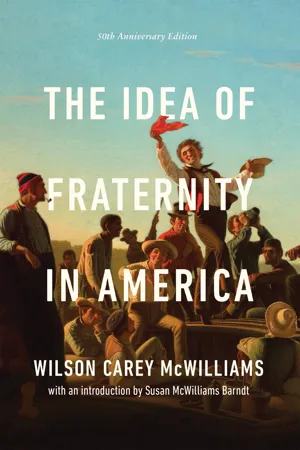
- English
- PDF
- Available on iOS & Android
The Idea of Fraternity in America
About This Book
"A complex, intellectually jarring, and valuable book, one which reveals how early America became her true self as we now know her." — Kirkus Reviews
The United States is currently experiencing a crisis of citizenship and democracy. For many of us, there is a sense of forlornness caused by losing sight of human connectedness and the bonds of community. Originally published in 1973, and long out of print, The Idea of Fraternity in America is a resonant call to reclaim and restore the communal bonds of democracy by one of the most important political theorists of the twentieth century, Wilson Carey McWilliams.
This sprawling and majestic book offers a comprehensive and original interpretation of the whole range of American historical and political thought, from seventeenth-century White Puritanism to twentieth-century Black American political thought. In one sense, it is a long and sustained reflection on the American political tradition, with side glances at other cultures and other traditions; in another sense, it is an impressive beginning to an original and comprehensive theory of politics, rooted in a new reading of a vast array of relevant sources. Speaking with a prescience unmatched by his contemporaries, McWilliams argues that in order to address the malaise of our modern democracy we must return to an ideal of our past: fraternity, a relation of affection founded on shared values and goals. This 50th anniversary edition, which offers a critique of the liberal tradition and a new social philosophy for the future, contains a new introduction from McWilliams's daughter, Susan McWilliams Barndt. She writes, "At a time when many Americans are wondering how we got to where we are today... this book demonstrates that there is in fact a lot of precedent for what feels so unprecedented in contemporary American politics."
Frequently asked questions
Information
Table of contents
- Cover
- Title Page
- Copyright
- Contents
- Preface
- Abbreviations
- Introduction to the Fiftieth Anniversary Edition
- Introduction
- I. Clan, Tribe, and City
- II. Fraternity and the Myths of Identity
- III. Fraternity and Modern Politics
- IV. The Ambiguous Ideal: Fraternity in America
- V. Puritanism: The Covenants of Fraternity
- VI. John Winthrop: e Statesman
- VII. The Fruits of the Earth: Cain in New England
- VIII. The American Enlightenment
- IX. The Jeffersonians
- X. The Divided House
- XI. Emerson and Thoreau: The All and the One
- XII. Nathaniel Hawthorne: The Citizen
- XIII. Herman Melville: The Pilgrim
- XIV. The Gilded Age
- XV. Whitman and Bellamy: Nations of Lovers
- XVI. Mark Twain: The Teacher
- XVII. Old Americans and New
- XVIII. Generations of the Lost
- XIX. Fearlessness and Fear: The New Deal and After
- XX. Native Sons
- Epilogue: A Note on Generation and Regeneration
- Bibliographic Notes
- Index